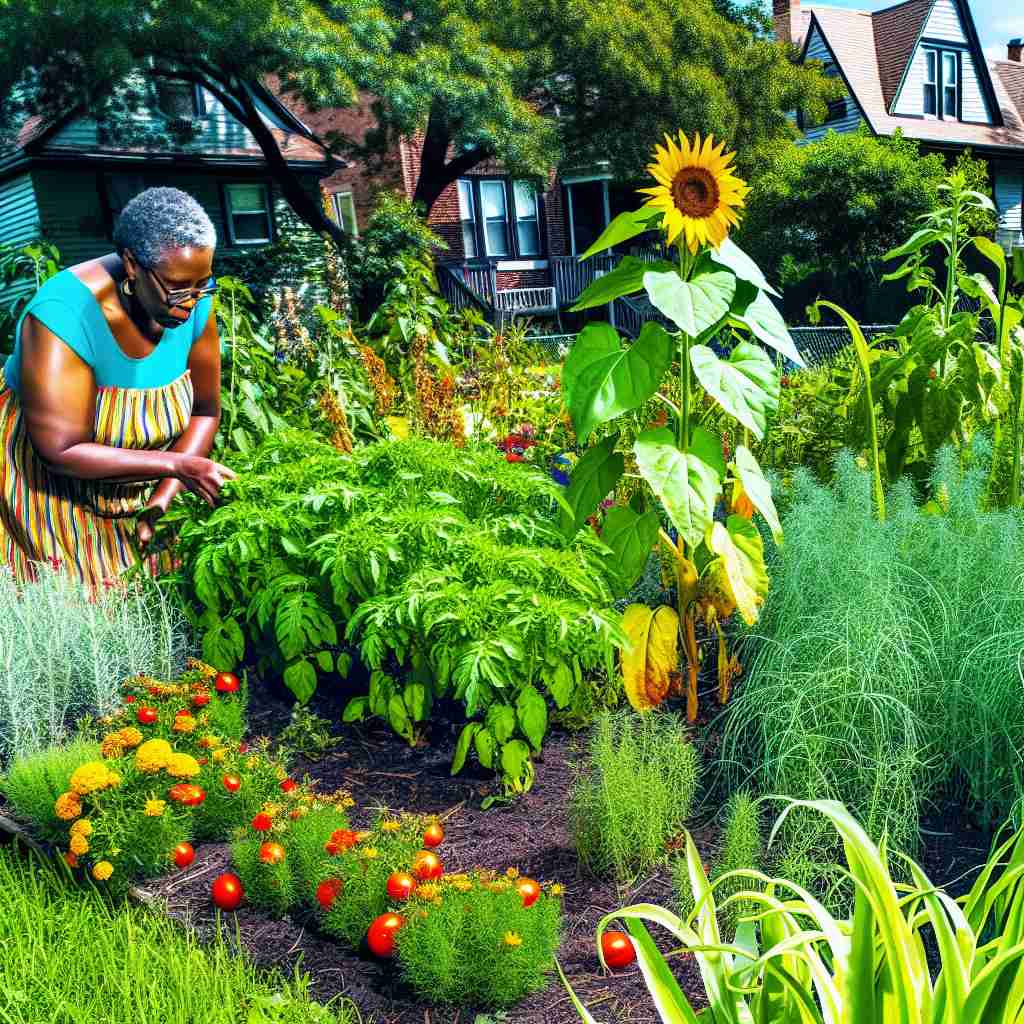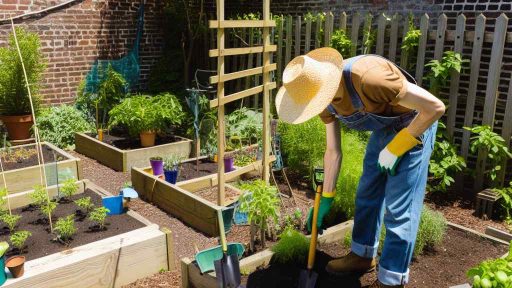Introduction to Companion Planting and Its Importance in Pest Control
Companion planting plays a crucial role in organic gardening.
It involves growing different plant species together for mutual benefits.
One of its primary advantages is pest control.
This method reduces the reliance on chemical pesticides.
Additionally, it enhances biodiversity within the garden ecosystem.
Benefits of Companion Planting for Pest Control
Companion planting offers several clear benefits.
- It attracts beneficial insects to the garden.
- These insects can help control harmful pest populations.
- Plants can naturally repel specific pests when grown together.
- Some plants enhance the growth and vigor of their neighbors.
For these reasons, gardeners find companion planting highly effective.
Key Principles of Companion Planting
Understanding key principles can maximize companion planting benefits.
First, some plants naturally ward off pests.
For example, marigolds repel nematodes and aphids.
Second, certain plants attract beneficial pollinators.
They enhance both yields and pest control efforts.
Lastly, knowledge of plant relationships is essential.
Some plants may compete for nutrients or hinder each other’s growth.
Practical Applications in Your Garden
Implementing companion planting strategies in your garden is straightforward.
Transform Your Agribusiness
Unlock your farm's potential with expert advice tailored to your needs. Get actionable steps that drive real results.
Get StartedStart by researching compatible plant pairings.
For instance, basil and tomatoes grow well together.
They enhance each other’s flavor and deter pests.
Another example is planting garlic near roses.
Garlic can help keep aphids away from blooming roses.
By applying these principles, gardeners can ensure healthier plants.
Moreover, they can create a balanced ecosystem.
This leads to better resistance against pests and diseases.
Overview of Organic Gardening Principles and Practices
Defining Organic Gardening
Organic gardening embraces sustainable methods to grow plants.
This approach prohibits synthetic chemicals and genetically modified organisms.
Instead, it uses natural fertilizers and pest control methods.
Additionally, it focuses on maintaining soil health and biodiversity.
Core Principles of Organic Gardening
One core principle is the concept of working with nature rather than against it.
Organic gardeners strive for an ecological balance in their gardens.
This balance is critical for healthy plant growth and pest control.
Another principle emphasizes the importance of healthy soil.
They enrich soil using compost and organic matter to boost fertility.
Proper soil management improves plant resilience and yields.
Practices in Organic Gardening
Crop rotation is a common practice among organic gardeners.
This technique helps to prevent soil depletion and disrupt pest cycles.
Additionally, organic gardeners often implement cover cropping.
Cover crops protect soil from erosion and improve its structure.
Mulching is also essential in preventing weed growth and retaining moisture.
Furthermore, organic gardeners often cultivate companion plants to promote growth.
Showcase Your Farming Business
Publish your professional farming services profile on our blog for a one-time fee of $200 and reach a dedicated audience of farmers and agribusiness owners.
Publish Your ProfileNatural Pest Control in Organic Gardening
Organic gardening promotes using natural predators for pest control.
Beneficial insects like ladybugs and lacewings can help manage pests.
Additionally, homemade sprays can deter insects effectively.
Neem oil and insecticidal soap are popular choices among organic gardeners.
Finally, maintaining diverse plant species can reduce pest infestations.
How Companion Plants Enhance Pest Resistance in Gardens
Understanding Companion Planting
Companion planting involves pairing plants for mutual benefit.
This method improves pest control naturally.
Growers utilize specific plant combinations for optimal results.
For instance, certain herbs repel harmful insects.
Natural Pest Repellents
Plants like marigolds deter nematodes and aphids effectively.
Petunias can ward off beetles and other garden pests.
Including these plants boosts the resilience of vulnerable crops.
Certain flowers attract beneficial insects, enhancing pest control.
Creating a Balanced Ecosystem
Implementing diverse plantings creates a harmonious garden environment.
Different species can suppress pest populations collectively.
For example, garlic and onions repel thrips and aphids together.
This balance reduces the likelihood of crop damage significantly.
Encouraging Beneficial Insects
Companion plants can attract predatory insects like ladybugs.
These beneficial insects prey on harmful pests.
Dill and fennel are excellent examples of plants that attract these helpers.
Additionally, planting flowers provides nectar and pollen sources.
Improving Soil Health
Some companion plants improve soil structure and nutrients.
Legumes, for instance, fix nitrogen in the soil.
This benefits neighboring plants, making them more resistant to pests.
A healthy soil environment fosters robust plant growth.
Implementing Companion Planting Techniques
Begin by researching compatible plant pairs for your garden.
Consider seasonal growth patterns when planning your layout.
Track the results and adjust combinations as necessary.
Experimenting will yield the best pest control strategies.
Explore Further: Legal Requirements for Beekeeping and Selling Honey in the USA
Top Companion Plants for Common Garden Pests
Marigolds
Marigolds attract beneficial insects that prey on pests.
They repel nematodes and other harmful soil pests effectively.
Additionally, their vibrant flowers add beauty to the garden.
Basil
Basil works wonders in repelling flies and mosquitoes.
This herb enhances the flavor of nearby tomatoes.
Furthermore, basil attracts pollinators, benefiting overall garden health.
Mint
Mint is a powerful deterrent for ants, aphids, and beetles.
This herb spreads rapidly, so plant it in containers.
Moreover, its aroma adds freshness to your garden space.
Nasturtiums
Nasturtiums lure aphids away from other plants.
Showcase Your Farming Business
Publish your professional farming services profile on our blog for a one-time fee of $200 and reach a dedicated audience of farmers and agribusiness owners.
Publish Your ProfileThey also attract predatory insects like ladybugs.
This brightly colored flower can serve as a trap crop.
Garlic
Garlic repels various pests with its strong scent.
It can help in reducing aphid and whitefly populations.
Also, garlic supports your overall garden health and biodiversity.
Chives
Chives deter pests like carrot flies and cabbage moths.
Their flowers attract pollinators, enhancing crop production.
Chives can be harvested regularly, promoting continuous growth.
Uncover the Details: Vertical Farming for Sustainable Agriculture in the USA
Case Studies: Successful Companion Planting Strategies in Organic Gardens
Introduction to Companion Planting
Companion planting enhances pest control in organic gardens.
It involves pairing plants that benefit each other.
This strategy improves biodiversity and plant health.
The Role of Marigolds
Marigolds are known for repelling nematodes and pests.
In a garden in Springfield, they reduced aphid populations significantly.
Jane’s organic garden saw a noticeable difference in tomato yield.
She planted marigolds alongside her tomatoes.
As a result, her tomatoes thrived without chemical pesticides.
Basil and Tomatoes
Basil acts as a great companion for tomatoes.
In Greenfield, Michael noticed enhanced flavor in his tomatoes when planted with basil.
This combination also repelled whiteflies and thrips.
He reported a healthier tomato crop and fewer pests.
Thus, basil helped Michael maintain organic methods effectively.
Chives and Carrots
Chives are beneficial when planted near carrots.
In Bella’s garden, they deterred carrot flies efficiently.
She planted them in alternate rows with carrots.
This practice resulted in fewer pest attacks and better carrot growth.
Chives also improved the overall soil quality over time.
Complementary Planting: Beans and Corn
Beans and corn create a classic companion planting duo.
In Farmington, a community garden showcased this strategy.
Here, beans added nitrogen to the soil for corn’s benefit.
The corn provided support for the climbing beans as they grew.
This partnership led to improved yields for both crops.
Implications of Companion Planting in Organic Gardens
These case studies illustrate the effectiveness of companion planting.
Gardeners can enhance pest control naturally using these strategies.
This approach not only boosts crop health but also promotes sustainability.
Organic gardeners have much to gain from these techniques.
Uncover the Details: Maximizing Neighborhood Engagement Through Inclusive Community Garden Events

Common Mistakes to Avoid When Implementing Companion Planting
Ignoring Plant Compatibility
Not all plants thrive together in companion planting.
Some combinations can harm each other.
Research compatible plants before planting.
Showcase Your Farming Business
Publish your professional farming services profile on our blog for a one-time fee of $200 and reach a dedicated audience of farmers and agribusiness owners.
Publish Your ProfileCheck resources to determine beneficial pairings.
Overlooking Soil and Sunlight Needs
Each plant has specific soil and sunlight requirements.
Ignoring these can lead to poor growth.
Ensure plants have similar needs in your garden.
Neglecting Seasonal Planting Times
Planting at the wrong season can diminish effectiveness.
Timing is crucial for successful growth and pest control.
Consult planting calendars for optimal timing.
Focusing Solely on Pest Control
Companion planting offers more benefits than pest control.
It improves nutrient availability and enhances growth.
Value all benefits when planning your garden.
Failing to Rotate Crops Annually
Crop rotation is essential in organic gardening.
It prevents pest and disease buildup in the soil.
Change plant positions each year for best results.
Neglecting Maintenance Practices
Regular maintenance is vital for companion planting success.
Weeding, watering, and monitoring pests are necessary steps.
Stay proactive to maintain healthy plants.
Underestimating the Importance of Research
Do not rely solely on anecdotal advice.
Conduct thorough research on companion planting strategies.
Utilize reliable gardening books and online resources.
Uncover the Details: DIY Garden Projects for Soil Health Improvement
Creating a Companion Planting Scheme
Understanding Companion Planting
Companion planting involves cultivating different plants together for mutual benefits.
This practice enhances growth and repels harmful pests naturally.
Additionally, it improves soil health and increases biodiversity.
Choosing Compatible Plants
Select plants based on their growth habits and pest-repelling qualities.
For example, marigolds deter nematodes and other pests effectively.
Meanwhile, basil enhances the growth of tomatoes and repels flies.
Planning Your Garden Layout
Design a garden layout that maximizes beneficial relationships between plants.
Consider the sunlight and water needs of each plant.
Space plants appropriately to avoid overcrowding and competition.
Implementing Pest Control Strategies
Integrate natural pest control methods alongside companion planting.
Introduce helpful insects, like ladybugs, to manage aphid populations.
Use barriers, such as row covers, to shield plants from pests.
Monitoring and Adjusting Your Scheme
Regularly observe your garden for signs of pest activity or disease.
Assess the effectiveness of your companion planting choices.
If necessary, adjust your plant combinations for better results.
Educating Yourself and Others
Stay informed about best practices in companion planting.
Share your experiences and successes within your gardening community.
Consider joining local gardening clubs for additional insights and tips.
The Role of Soil Health and Biodiversity in Effective Pest Control
Understanding Soil Health
Soyl health is fundamental to any successful organic garden.
It establishes a thriving ecosystem that supports plant growth.
Showcase Your Farming Business
Publish your professional farming services profile on our blog for a one-time fee of $200 and reach a dedicated audience of farmers and agribusiness owners.
Publish Your ProfileHealthy soil contains a diverse population of microorganisms.
These microorganisms break down organic matter and release nutrients.
Moreover, they help suppress harmful pathogens and pests.
Benefits of Biodiversity
Biodiversity enhances resilience in gardens against pest outbreaks.
When various species coexist, predator-prey dynamics stabilize.
This balance reduces the chances of pest domination.
Plant biodiversity also attracts beneficial insects like ladybugs.
These insects provide natural pest control, minimizing chemical use.
Companion Planting Strategies
Companion planting maximizes the benefits of biodiversity.
This technique involves pairing plants that support one another.
For instance, marigolds deter nematodes and other pests effectively.
Likewise, basil planted near tomatoes can enhance growth.
These pairings create a more balanced and thriving garden ecosystem.
Integrating Organic Practices
Organic gardening practices promote soil health and biodiversity.
Using compost enriches soil while supporting beneficial microorganisms.
Additionally, rotating crops helps prevent pest and disease cycles.
Mulching adds organic matter, suppresses weeds, and retains moisture.
Each practice contributes to a healthier and more resilient garden.
Additional Resources
A charming small-scale market garden, Brookstone Gardens …
Meet Anton from Rissa, Norway “I teach small-scale organic farming …




